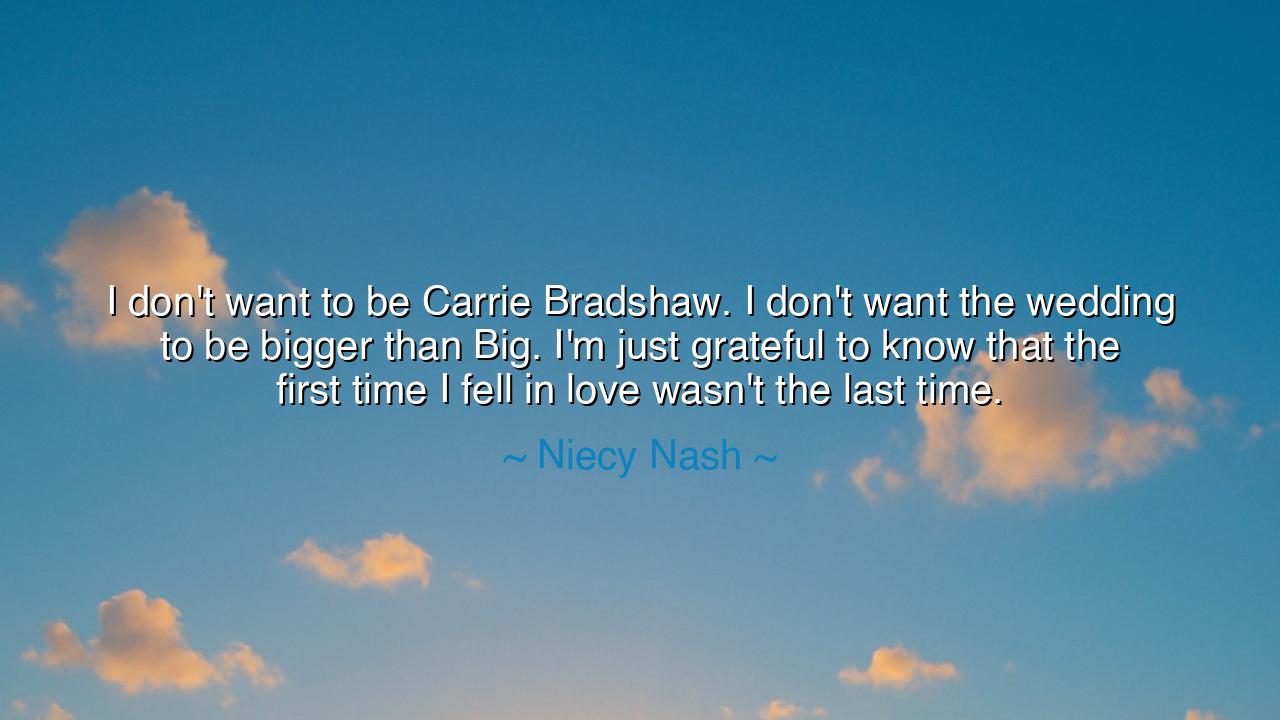
I don't want to be Carrie Bradshaw. I don't want the wedding to
I don't want to be Carrie Bradshaw. I don't want the wedding to be bigger than Big. I'm just grateful to know that the first time I fell in love wasn't the last time.






In the words of Niecy Nash, we hear a voice that pierces through illusion to uncover truth: “I don't want to be Carrie Bradshaw. I don't want the wedding to be bigger than Big. I'm just grateful to know that the first time I fell in love wasn't the last time.” Her words are both rejection and affirmation—a rejection of love as spectacle, and an affirmation of love as renewal. The wedding, though a day of beauty, must never outshine the covenant of hearts.
When Nash speaks of Carrie Bradshaw and Big, she invokes a story beloved in popular imagination, where romance becomes entangled with vanity and appearances. But she declares her freedom from that shadow, teaching that love must be more than performance. A marriage clothed in glamour but starved of substance is like a temple adorned with gold but crumbling within. She seeks not the stage, but the sanctuary, not applause, but the quiet strength of intimacy.
The second half of her words carries deeper wisdom: gratitude that the first love was not the only love. Many fear that once love is lost, it shall not return, and their days will be barren of affection. Yet Nash proclaims that love is not a single chance, but a river that flows again even after drought. This is hope for the broken-hearted, assurance that the soul is never finished with love so long as it still beats.
History recalls the life of Eleanor of Aquitaine, who after the collapse of one marriage, entered another that shaped the course of Europe. Though she endured disappointment and betrayal, her story proves that love’s fire may be rekindled even after ashes. In like manner, Nash’s words tell us that the heart is not bound to a single story, but may be renewed, rebuilt, and made radiant again.
Thus let this lesson endure: do not hunger for a love adorned only with spectacle, nor despair when the first bond breaks. For true love is greater than ceremony and stronger than loss. Be grateful, as Nash is, for every new beginning, and remember that the worth of a marriage is not measured in gowns, jewels, or spectacle, but in the quiet miracle of discovering love again—and knowing it is not your last.






UCNguyen Vu Uyen Chi
Niecy Nash’s comment resonates with me because it challenges the idea of a wedding being the climax of love. It's refreshing to hear someone embrace a more grounded view, where the importance is placed on the enduring quality of love, not the event. It's a reminder that love, in all its forms, can grow beyond the big moments. What do you think—should weddings be more about the bond rather than the event itself?
KDKhoi Do
This quote is a great reminder of the importance of real connection over materialistic expectations. Niecy Nash is rejecting the idea of a wedding being the peak of love and instead focusing on the deeper and lasting nature of love itself. It seems like she's saying it’s not about having a huge wedding, but rather having a meaningful relationship. Do you think the pressure to have a perfect wedding detracts from the true essence of marriage?
QQuan
It's interesting how Niecy Nash is rejecting the 'bigger than life' narrative, which is so common in pop culture, especially with iconic characters like Carrie Bradshaw. This perspective makes me wonder, is there a pressure on brides to have the most unforgettable wedding? Her focus on the personal meaning rather than the grandeur speaks volumes. How do you feel about the societal pressure to have a perfect wedding day?
YNNhu y Nguyen
I love how this quote highlights the value of knowing that love isn’t a one-time thing. It’s almost like Niecy Nash is saying that love can be more than a grand moment—it can be an ongoing journey. The idea that falling in love for the first time wasn’t the last time is such a hopeful and reassuring thought. Do you think most people feel the same way about love being a journey rather than a single event?
MAMua ALau
This quote really made me think about how much society tends to romanticize wedding days, especially when it comes to big, extravagant celebrations. I appreciate that Niecy Nash isn’t focusing on making the wedding the biggest event, but rather cherishing the love she has. It feels like a reminder that love itself, not the spectacle, is what truly matters. Do you agree that love should be the main focus of a wedding?